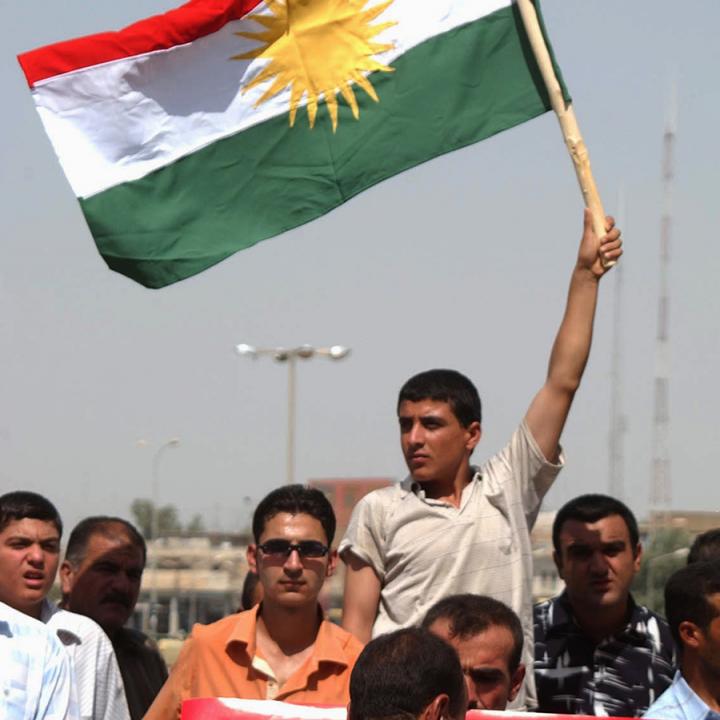
- Policy Analysis
- Fikra Forum
The Kurdish Referendum and the Status of Kirkuk

July 5, 2017
Iraqi Kurdistan has finally set September 25 as the date for an independence referendum. After Mosul fell to the Islamic State (IS) in 2014, Masoud Barzani announced that the region will hold a referendum on independence, as Iraq has already essentially partitioned. Barzani renewed his call for a referendum on February 2, 2016. Calling for a referendum has raised hackles in Baghdad time and again; this time, the referendum is going to cover the disputed territories of Kirkuk, Khanaqin, Sinjar, and Makhmour. It is expected that the yes vote for independence will win, but the real question is: is it possible to settle the problem of Kirkuk and the disputed territories through a unilateral referendum?
After the collapse of Saddam Hussein’s regime, particular attention was paid to Kirkuk by Iraqi and non-Iraqi policymakers alike. This is mainly due to the fact that the city has been a point of dispute between the Kurds and successive Iraqi governments for more than seventy years. Article 58 of the Transitional Administrative Law (TAL), Iraq’s provisional constitution in 2004, committed the Iraqi government to “act expeditiously to remedy the injustice caused by the previous regime’s practices in altering the demographic character of certain regions, including Kirkuk”. In 2005, the new Iraqi constitution was adopted and ratified. Article 140 replaced Article 58 of the TAL, calling for a three-step process in Kirkuk and other disputed territories involving ‘normalization,’ to be followed by a census, and then finally a referendum to determine whether or not the citizens of Kirkuk want to join the Kurdistan region. In accordance with Article 140, the status of Kirkuk was set to be settled through a referendum to be held no later than December 31, 2007. But that deadline has long passed and the status of Kirkuk has remained as is.
The UN also tried to find a solution for Kirkuk. In April 2009, UN Special Representative Staffan de Mistura formally presented UNAMI report on disputed territories to Iraqi central government officials and the KRG president. Four possible options for resolving the dispute over Kirkuk were given: 1) reformulating Article 140 to make it unambiguous and clear, which would mean clarifying eligibility and voter registration and the physical boundaries of the area; 2) retaining Kirkuk’s status as a governorate that is not organized into a region, as with the other Iraqi governorates; 3) “dual nexus” which administratively links Kirkuk to both Baghdad and the KRG; and 4) “special status” that gives Kirkuk special administrative powers different from any other province in Iraq with high degree of administrative self-rule and less direct influence from Baghdad and Erbil. However, the report did not receive a particularly enthusiastic welcome and was rejected by both Baghdad and KRG. The inability of the disputing parties to agree upon one of the above options was a major reason for overlooking the UNAMI report.
Many other suggestions have been made by academics and research centers since 2003. The International Crisis Group (ICG), for example, has recommended several solutions. In 2006, they suggested that Kirkuk should become a stand-alone federal region for an interim period of ten years with power-sharing between its four communities. However, there was not any real incentive for the Kurds and was therefore overlooked. The ICG outlined another solution in 2008 call the “oil for soil” deal. This would allow the Kurds to use the oil fields within the Kurdistan region in exchange for deferring Kurdish claim to Kirkuk. This deal was also rejected by the Kurds, one explanation being that the suggested deal gave the Kurds nothing they did not already have as the region was already able to manage its own oil and gas.
Thus, all attempts to solve the Kirkuk problem have failed since 2003. One reason for not being able to reach a solution to the governance problem is because it is usually linked to the question of territory.
Settling ethno-territorial conflicts have generally proven more difficult and elusive than those over political interests. In Kirkuk, due to the emotional and historical claims over disputed territories, even if leaders could reach an agreement they would find it difficult to justify any compromises to their constituents.
After the fall of Mosul in 2014, however, a new era began in Iraq in which the Kurds appear to be the main winners and are strong enough not to have to compromise. Now the Peshmerga have taken over most of the disputed territories. Soon after taking control of Kirkuk, Barzani made a visit to the city and vowed that the Peshmerga would never withdraw. From the Kurds’ perspective, the Peshmerga liberated these areas and all sides should be committed to the new reality.
Many Kurds believe that as Article 140 was not implemented and negotiations have failed time and again, the time is now ripe to incorporate Kirkuk into the Kurdish region via referendum. The referendum, however, is expected to spark a showdown with Baghdad and the local communities of Arabs and Turkmen living in the disputed territories. Indeed, Arab-Kurdish conflict over Kirkuk and other disputed territories in the post-IS period will be the biggest potential threat to stability in Iraq.
In addition, the heavy presence of the Popular Mobilization Units and the role of Iran and Turkey cannot be underestimated. The Kurdish leadership appears to be well aware of these obstacles, which is why they have already announced that this referendum will be legally non-binding. They understand that holding a unilateral, legally-binding referendum would be punching above their weight.
The problem of Kirkuk and the disputed territories cannot be solved through any unilateral referendum by any of the parties involved. A real solution can only be achieved through a compromise in which all the parties will have to make concessions.


